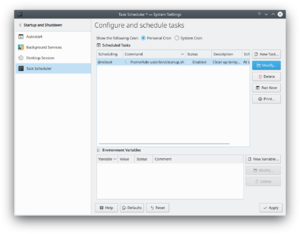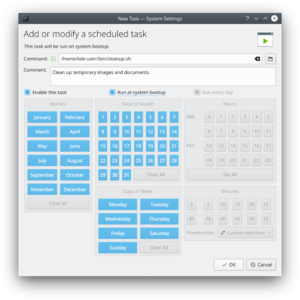Configuration du système/Planificateur de tâches
Information génerale
Planificateur de tâches est une interface graphique pour l'outil standard "cron". Avec lui, des commandes (où tâches) peuvent être exécuté à une date spécifique, ou selon un intervalle définie (temps entre les exécutions).

Usage
Le planificateur de tâches peut être démarré, en démarrant l'application Configuration du système. Sélectionner suivie par .
Ajouter et modifier une tâches
- Cliquer sur "Nouvelle tâches..." pour ajouter une nouvelle taches, ou "Modifier..." pour modifier une tâche existante. La page Ajouter ou modifier une tâche planifiée va être affichée.

- Entrer une commande qui va être exécutée. Cliquer sur un dossier pour le choisir depuis une fenêtre de dialogue.
- Enter a comment (optional). This should be descriptive, explaining what the task will do as the command may not always be obvious.
- Click Enable this task to enable the task to run.
- Click Run at system bootup to enable the script to run each time the system is booted.
- Click Run every day to enable the script to run every day. This will automatically select the appropriate options.
- Using the buttons, choose when the command should be run. Not all parameters are required, those not needed may be left blank.
- Hours and Minutes are the time of day to run the task, not an interval.
- When done, click . The task will be added and scheduled if enabled.
Removing a task
To completely remove a task, select the task from the list and click the Delete button. This will permanently remove the task.
Environment Variables
Sometimes a task or multiple tasks need a specific variable set, it must be added in the Environment Variables section. The cron utility uses its own environment, system wide and user specific variables are not used. Click New Variable to add a new variable definition, or Modify to change an existing variable.
- Enter the name of the variable to use. This name:
- Must consist of letters, digits and underscore ('_') only
- Must start with a latter
- Should not be a reserved or commonly used system variable. See https://pubs.opengroup.org/onlinepubs/000095399/basedefs/xbd_chap08.html for more information
- The value the variable will contain. This can be a number or string.
- Enter a brief description of the variable.
Astuces
- All the files that are modified are located in the /etc/cron directory where there are numerous files to look at.
- The command-line tool that allows you to have a look at the currently installed cron-jobs is
crontab -l
(that's the letter L).
Plus d'information
- Documentation officiel de KDE
- Cron (Wikipedia)
- Cron (Arch Linux wiki)

